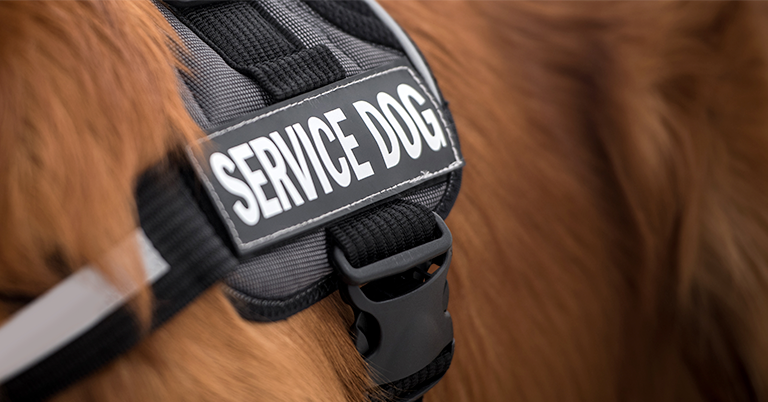
Request Free Consultation
To get answers to questions about your injury, contact Catalano Law for a FREE case evaluation. We’ll assess your case, explain your legal options, and recommend the next steps at no cost. We’re here when you need us.
Contact Form
General Contact Form

Originally published May 17, 2021. Updated Novermber 14, 2023.
New York law makes dog owners liable for attacks by their dogs. But what you must prove to recover compensation after a dog attack and how much you can recover will depend on the dog.
A bite from a service dog could complicate the process of recovering compensation. The dog’s history and training will be well documented. This documentation may cast doubt on your version of events.
Here is some information on dog bite law in New York and what you need to know when a service dog bites you.
New York Dog Bite Law
Some states impose strict liability for dog bites on the dog owner. This means that the owner is always liable for the damage the dog causes. A dog bite victim in these states does not need to prove that the owner acted negligently.
Other states require dog bite victims to prove negligence. In these states, the dog might receive “one free bite” before the law imposes liability on the owner, since if the owner did not know and had no reason to know of the dog’s vicious tendencies before, a court will not hold the owner liable that first time. New York uses a hybrid approach to dog bite liability.
Strict Liability for Dangerous Dogs in New York
When a dangerous dog causes physical injury to a person, pet, or farm animal, the law imposes strict liability on the owner. This means that the dog bite victim does not need to prove that the owner behaved negligently in allowing the dog to bite the victim.
Strict liability makes it easier for dog bite victims to recover compensation in New York than in states that require proof of negligence. But New York’s dog bite statute has some important limitations.
Dangerous Dog
For strict liability to apply, the dog must fall into the definition of “dangerous dog.” According to the statute, the dog bite victim can prove the dog’s danger in two ways:
- Unjustified Attack: The dog attacked a person, pet, service dog, guide dog, or hearing dog without justification and caused physical injury or death. This option allows you to show the danger of the dog merely by showing what happened in your case. But the statute still requires you to show that the dog had no justification for attacking.
- Dangerous Behavior: The dog behaves in a manner that a reasonable person would interpret as a threat to people or pets. This option requires you to prove negligence by the owner.
Medical Costs
The dog bite law only requires the owner to pay the medical costs of the dog bite victim. You cannot recover compensation for lost income, diminished earning capacity, pain, or suffering by using strict liability.
Imposing Strict Liability on Service Dogs
The breadth of strict liability makes it the most viable path to recovering compensation for a service dog bite. A service dog would likely have a well-documented history of training and good behavior. This history would likely show that the dog had no prior threatening behavior.
But under the “unjustified attack” option, you do not need to show the dog behaved dangerously. Rather, you just need to show that your bite was unjustified.
This explains why most service dogs wear a vest that warns bystanders not to bother the dog. The warning helps the dog owner prove justification for bites. If a bite occurs because the victim bothered the service dog despite the warning, the owner can argue that they are not at fault for the victim’s injury. If the judge agrees that the dog was provoked, the victim won’t be able to gain compensation.
Emotional Support Dogs Are Not Considered Service Dogs
Because service dogs undergo strict training, it would be unusual for a true service dog to attack unprovoked or out of aggression. However, some dog owners and dog attack victims may confuse emotional support animals with service animals.
Emotional support animals do not require any kind of training, unlike service animals. In addition, unlike service animals, emotional support animals don’t have rights to enter all public spaces under the Americans with Disabilities Act.
Because they haven’t been trained to deal with being in a place like a restaurant or a store, an emotional support animal may be more likely to become agitated or aggressive in public, and the owner may not know how to calm the animal down or prevent it from acting out.
In one 2023 case, a “helper dog” in Lancaster, NY was ruled to have caused serious injury when he bit his owner’s neighbors. In another instance, an 11-year-old boy in Manhattan was attacked by his aunt’s “therapy dog.”
If you were bitten by a service dog, there is a possibility it was not actually a service dog and was an emotional support dog instead. This could make it easier to prove negligence and get compensation for your injuries.
What to Do After a Dog Bite
Whether it’s a minor nip or a serious attack, knowing how to respond in the aftermath of a dog bite is crucial for the protection of your health and legal rights. Here are some essential steps to take.
- Seek Immediate Medical Attention: Even if the bite seems minor, it’s important to get it checked by a medical professional. Dog bites can lead to infections, and some may require tetanus shots or antibiotics.
- Document Your Injuries: Take photos of any wounds before treatment. This can be valuable evidence if you need to pursue legal action.
- Collect Information: Get the contact and insurance information of the dog’s owner, as well as the contact information of any witnesses. Note the dog’s breed, size, and any distinguishing features.
- Report the Incident: Inform local animal control about the incident. This is especially important if the dog seems dangerous.
- Monitor Health and Expenses: Track any costs related to the attack and keep a journal of challenges posed by your injuries over time.
Medical and Financial Consequences of a Dog Bite
Dog bites can lead to a range of medical and financial consequences, some of which are quite severe.
On the medical front, dog bites can easily become infected, leading to conditions like cellulitis, abscesses, or more serious infections like rabies. Physical injuries can vary from minor scratches to deep lacerations, broken bones, and nerve damage. Bites can also result in permanent scarring and disfigurement. Beyond physical harm, dog bite victims, especially children, often suffer from psychological trauma, including PTSD, anxiety, and phobias related to dogs.
Victims may also suffer financially. Treatment for dog bites can be costly, especially if it involves hospitalization, surgery, long-term physical therapy, psychological counseling, or the purchase of assistive devices. Also, if the victim needs time off work to recover, this can result in lost wages or even job loss in the worst cases.
Hire a New York Dog Bite Attorney
An experienced New York dog bite attorney can help you navigate the state’s dog bite laws and develop a legal strategy for recovering fair compensation for your injury.
Asserting strict liability and negligence will require both legal knowledge and experience in dog bite law, especially if you were injured by a service animal while it was working. Contact Catalano Law for more information on dog bite law or to schedule a free consultation.

